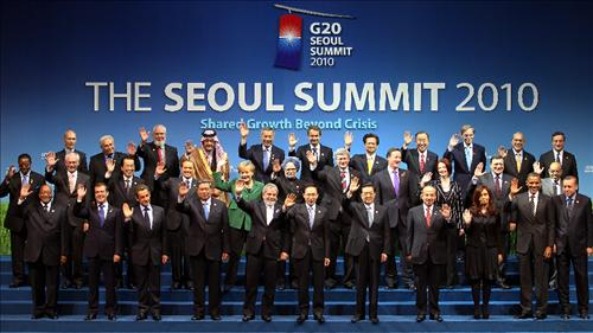<#303 View of Foreign Press>
G20 Seoul Summit Raises Korea’s Status
By Oh Uhl, Guest Reporter

The 2010 G20 Seoul Summit was held at the Convention & Exhibition (COEX) Center in Seoul on November 11th and 12th. The South Korean government tirelessly prepared for the Summit meeting as a host country. It regulated traffic around the venue and sought citizens’ understanding and voluntary participation during the Summit meeting period. In particular, to aid the main agenda of finding a solution to the problem of exchange rates, the Korean government presented the “Korea initiative” as a key global program and the G20 summit members agreed to set guidelines to assess current account surpluses and deficits. The global financial safety net and development issues under the theme of “Shared Growth Beyond the Crisis” were also presented. Let’s take a look at the foreign press coverage of the G20 Seoul Summit in South Korea.
The Wall Street Journal estimated on November 12th that South Korea had advanced beyond the category of a developing nation as South Korea prepared to host the G20 Summit. It also mentioned South Korea thought the G20 Summit would be the best way to demonstrate that South Korea has grown, and judged that South Korea “reshaped” the economic relationship between advanced and developing nations.
Reuters shed light on the “Geopolitical Shift” of the existing global system to Korea in this G20 Seoul Summit held in South Korea. On November 13th it highly praised the dramatic development of the Korean economy in just a few decades and placed importance on its position as an international trading spot and a promising global leader with the role of mediating conflicts between other countries, especially the United States and China, after G20.
Bloomberg focused on South Korea’s G20 preparation in an article published November 1st. However, the tone was a little ridiculous. It claimed, “City officials leave their desks this week to sweep the streets of Seoul while seven-year-old children study economics…” And it mentioned that President Lee Myung-bak’s nickname is “bulldozer” and worried that the government’s excessive security measures to tighten restrictions might exert a bad influence. In addition, it referred to Korean preparation processes such as changing the College Scholastic Aptitude Test date and providing promotional events.
Before this summit, many Western countries laid the responsibility on South Korea for the decline of Asian currencies, and criticized the devaluation of Korean currency, the won. Specifically, Bloomberg published the article “Asian Currencies Decline, Led by Won, on Intervention Risk” so that South Korea lost face as a G20 host. Nevertheless, after the G20 Seoul summit, many members of the foreign press reported that G20 countries failed to suggest a concrete solution to the exchange rate problem in this G20 Seoul summit but they put a high valuation on the role of South Korea. They also appreciated that South Korea performed the role of mediator very well. The domestic press shared this view. In particular, The Korea Times praised mature civic awareness in the article “Well done”. However, excessive promotional activities created ill feelings among the foreign press. Even though the outcome of G20 Seoul summit was not satisfactory, we now know that we can recognize South Korea as a leader of Asia.
오울 객원기자
Tribune@cnumedia.com

